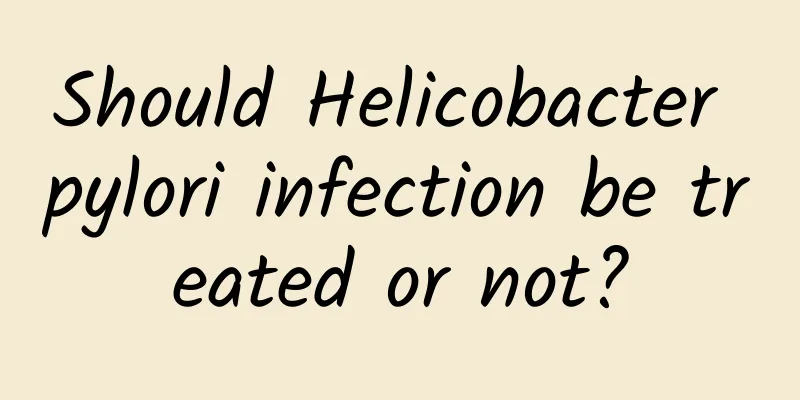Should Helicobacter pylori infection be treated or not?

|
With the implementation of the two-child policy, many babies have been born into this colorful world. When babies enter the stage of adding complementary food, weaning, and normal eating, some parents like to test the temperature before feeding their babies, and some parents even feed their babies mouth-to-mouth. In this way, some bacteria may be spread inadvertently, and Helicobacter pylori (Hp) is one of them. What is Helicobacter pylori? Many people have heard of Helicobacter pylori, a Gram-negative (G-) bacillus that exists in the mucosa of the pylorus and gastric antrum of the stomach and is an S-shaped or curved gram-negative bacillus. It is also the only known bacterium that can survive in the human stomach. How is Helicobacter pylori destroyed in the stomach? Studies have shown that after Hp reaches the surface of the gastric epithelium, it firmly connects to the epithelial cells through something called "adhesin" to avoid being excreted from the stomach along with food. Hp itself can secrete enzymes (superoxide dismutase and catalase) to protect itself from being killed by neutrophils; and Hp itself is rich in urease, which can produce ammonia by hydrolyzing urea, thereby forming an "ammonia cloud" protective layer around itself to resist the killing effect of gastric acid. Through the above points, Hp can survive in the human stomach pylorus to further damage the gastric mucosa. Other toxins produced by Hp can cause damage to gastric mucosal epithelial cells and stimulate toxic immune responses of local cells, thereby damaging the gastric mucosa and causing diseases such as peptic ulcers. How Helicobacter pylori is transmitted The most widely accepted theory is that Helicobacter pylori is transmitted through the digestive tract, which can be mouth-to-mouth (sharing tableware, water cups, kissing, feeding), stomach-to-mouth (stomach reflux into the mouth), or feces-to-mouth (not washing hands before meals or after defecation). For example, some parents like to chew the food into pieces before feeding it to their babies; some people do not wash their hands after defecation, so Helicobacter pylori can take the opportunity to "lurk" in places they have touched; many people do not use serving chopsticks when dining together, etc., all of which can lead to the spread of Helicobacter pylori. Therefore, Helicobacter pylori infection has two characteristics: first, it clusters in the family. For example, if one spouse of a couple who has been married for more than three years is infected with Helicobacter pylori, 80% of the spouse and 60% of the children are also positive for Helicobacter pylori. Second, as people age, their chances of being exposed to Helicobacter pylori increase greatly, and the infection rate of Helicobacter pylori also increases. To prevent Helicobacter pylori, you need to do the following: Wash hands before meals and after defecation Brush your teeth carefully and rinse your mouth after meals Eat cooked food Drink clean drinking water, not raw water Separate meals as much as possible and use sterilized bowls, chopsticks and spoons Do not feed infants and young children mouth-to-mouth or blow food into the mouth to cool it before feeding it A cupboard with high-temperature disinfection function can kill Helicobacter pylori, or you can boil the dishes in a pot with boiling water for a while when washing them. Under what circumstances do we need to eradicate Hp? my country is a high-infection area for Hp, with a population Hp infection rate of up to 50%, which means that about half of the people in China carry Hp. So, if we find out that Helicobacter pylori is positive, do we need to perform eradication treatment? Experts gave the answer in the "Fifth National Consensus Report on the Treatment of Helicobacter pylori Infection". If the following conditions exist, experts recommend eradication treatment: Peptic ulcer Gastric mucosa-associated lymphoid tissue lymphoma Chronic gastritis with indigestion symptoms or gastric mucosal atrophy and erosion Early gastric tumors have been removed by endoscopic surgery or subtotal gastrectomy Long-term use of proton pump inhibitors (called proton pump inhibitors) Have a family history of gastric cancer Plan to take NSAIDs (including low-dose aspirin) long-term Unexplained iron deficiency anemia Idiopathic thrombocytopenic purpura Other Helicobacter pylori-associated diseases (eg, lymphocytic gastritis, hyperplastic gastric polyps, Ménétrier's disease) I also strongly advocate the eradication of Helicobacter pylori, so not all people infected with Hp need to eradicate Hp. How to cure Helicobacter pylori If you want to completely eradicate Helicobacter pylori, you must pay attention to "combination, sufficient dosage, and regularity". The treatment must be standardized, a one-time cure, reduce recurrence, and pay attention to preventing reinfection. According to the 2017 "Fifth National Consensus Report on the Treatment of Helicobacter pylori Infection", the eradication plan recommended is: Proton pump inhibitor (PPI) + bismuth + 2 antibacterial drugs, a total of 4 drugs; Treatment course: Take continuously for 10-14 days; PPIs and bismuth: Take the standard dose twice a day, orally half an hour before meals. Two antibiotics: Take each after a meal. [Standard dose of PPI: esomeprazole 20 mg, rabeprazole 10 mg (or 20 mg), omeprazole 20 mg, lansoprazole 30 mg, pantoprazole 40 mg, ilaprazole 5 mg; standard dose of bismuth: potassium bismuth citrate 220 mg, bismuth pectin to be determined (commonly used in clinical practice 200 mg)] Two antibiotic options: |||| (Note: qd is once a day, bid is twice a day, tid is three times a day, qid is four times a day) Pharmacist's special reminder: After being infected with Helicobacter pylori, many people do not have obvious symptoms, but some people will develop certain Helicobacter pylori-related diseases after infection. Therefore, not all people who test positive for Helicobacter pylori need to undergo eradication treatment, but need to be specifically analyzed based on personal infection status, past medication status, family history of gastric cancer, personal gastric mucosal conditions, etc. The eradication rate of the quadruple regimen can reach 85%~94%. If the initial eradication treatment fails, don't worry, you can still choose a remedial plan. References: [1] Zhang Shutian, Cheng Rui. A different perspective on Helicobacter pylori[J]. Chinese Journal of Internal Medicine, 2017, 56( 5 ): 331-334. [2] Cheng Hong. Issues to be noted in the detection of Helicobacter pylori infection[J]. Chinese Journal of Digestion, 2017, 37(3): 150-152 [3] Translated from: H. Pylori: Know the Facts, MNT, 11 July 2016 [4] Analysis of Helicobacter pylori 2014-11-19 Source: Digestion Channel of Medical World [5] About Helicobacter pylori - Common knowledge we should know. Xu Deliang (Department of Gastroenterology, Zaozhuang Municipal Hospital, Shandong) [6] Liu Wenzhong, Xie Yong, Lu Hong, et al. The fifth national consensus report on the treatment of Helicobacter pylori infection[J]. Gastroenterology, 2017, 22(6): 321-335. |
<<: What dishes are good with grass carp? The nutritional value of grass carp head tofu soup
Recommend
What's going on? It's getting looser down there.
The loosening down there may be due to aging, or ...
Why should we drink enzymes? How to choose enzymes?
Good enzymes should have the fragrance of plants,...
When I take statins, my arm muscles hurt. Could it be that my muscles have dissolved?
A friend told Huazi that he had found plaques in ...
I know you are hot! But I really advise you not to drink iced drinks casually! (Not because it is cold)
Recently, Mr. Wang bought a few cups of iced coff...
Does soup have the "five sins" and is it junk food?
Chinese people have loved drinking soup since anc...
Is shaving your head a standard for babies in summer?
As the weather gets hotter, babies often sweat. I...
Is surgery necessary for endometrial polyps?
Uterine intrauterine polyps are a very common gyn...
Belly gurgling pregnancy
Many pregnant women will find that their stomachs...
Why does a woman feel pain at the junction of her hip and thigh?
Because of work or other reasons, many people now...
How many days of pregnancy do you feel?
Many women feel that pregnancy is a sacred thing,...
Are there student tickets for high-speed rail tickets for junior high school students? How can middle school students buy student tickets?
Normally, if one of the student's parents is ...
Why does vaginal bleeding occur after taking Chinese medicine?
Vaginal bleeding after taking traditional Chinese...
The hot season is coming——Prevent intestinal infectious diseases
In midsummer, the temperature is high, the humidi...
Is itchy breasts a sign of pregnancy?
We all know that women's breasts are also cal...
What are the landmark buildings in Xishuangbanna, Yunnan? Guide to self-driving tours to Xishuangbanna
Xishuangbanna, in ancient Dai language, is called...









